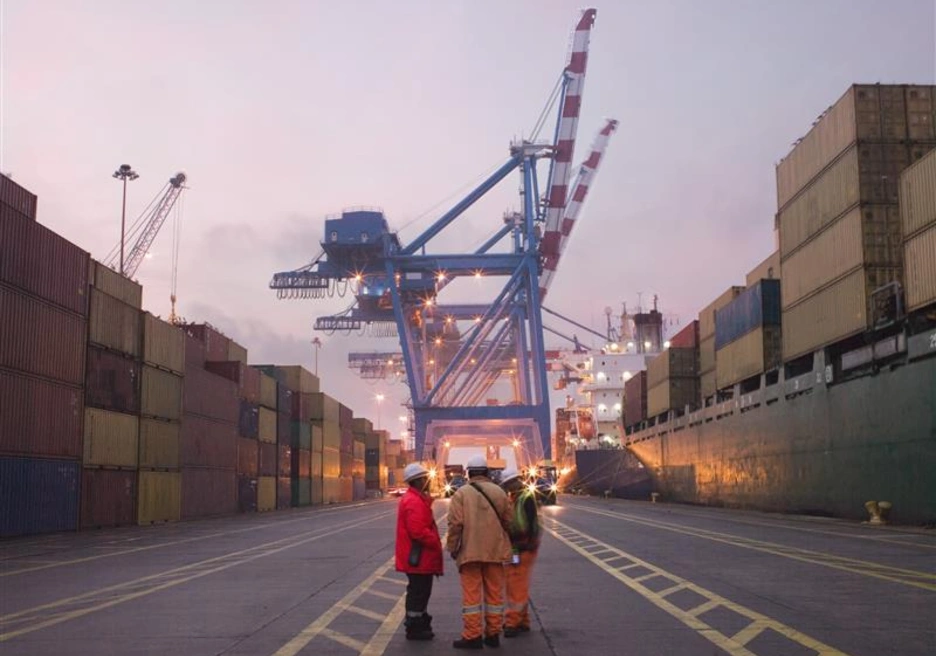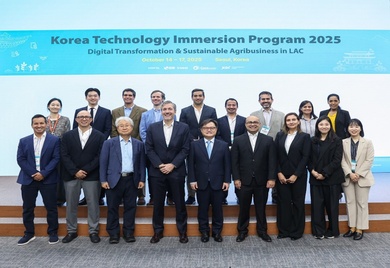Four Areas Ports Can Work on to Successfully Navigate the Future

In today's interconnected economy, logistical efficiency is a cornerstone of economic progress, and the port sector plays a vital role within the supply chain.
Ports are a key link in the global supply chain, being the entrance to supplies for the local industry and imports for countries as well as key to exporting raw materials, agricultural commodities, intermediate and finished goods to external markets.
With over 80% of the world's trade conducted via maritime routes, ports are essential nodes for regional economic development.
However, promoting sustainability (including mitigation, adaptation, and natural capital) and economic integration within the industry is crucial to ensure long-term growth.
Continue reading to discover how MSMEs, through their interactions at the port level, can integrate into countries’ supply chains and explore the role of ports in promoting environmental sustainability and creating economic opportunities for women, as outlined in the IDB Invest report "Port Ecosystem in Latin America & The Caribbean: Sustainable and Inclusive Value Chains and Operations.''
Value Chains
MSMEs are fundamental to economic diversification and sustainable growth in Latin America and the Caribbean.
These businesses could integrate to the countries’ supply chains, highlighting their interaction at the port level, as well as the role of ports in environmental sustainability and economic opportunities for women.
Despite their importance, MSMEs face significant challenges in fully integrating into the port ecosystem, such as inadequate mapping, visibility, and support in training and professionalization.
According to McKinsey, “MSME and large company productivity move in tandem in most subsectors, indicating spillovers if the right conditions are created. For example, automotive MSMEs have gained operational proficiency through systematic interactions with productive original equipment manufacturers.”
These enterprises represent a substantial part of the region's economic fabric but contribute less than half of GDP and only 12% of exporting companies in developing countries.
To enhance MSME integration, ports could undertake the following recommendations, based on interviews with more than 20 key stakeholders in Latin America and the Caribbean and US port sectors.
These include ports of TCP in Uruguay, MIT in Panama, Ventura Group in Colombia, Port Spain in Haiti, and Port of Long Beach in the USA.
- Detailed Mapping and Characterization: Conduct comprehensive mapping and characterization of MSMEs to understand their roles and potential within the port value chain.
- Sustainability and economic development officers: Appoint officers to oversee the implementation of strategies aimed at integrating MSMEs.
- Adjusted Procurement Processes and Port services: Modify procurement processes and port services to meet MSME needs, such as setting minimum MSME participation in procurement and offering differentiated tariffs and conditions, respectively. Also interacting with key port customers, could facilitate joint efforts to integrate MSMEs in the logistics value chain that is not directly dependent on the port itself, like certain transportation and storage services.
- Development Programs: Deploy capacity-building initiatives and advisory services to support MSME suppliers and clients
- Innovative Financial Products: Introduce products such as reverse factoring lines and flexible payment options to enhance the financial health of MSMEs.
Mapping suppliers is crucial to differentiate between subsistence MSMEs and those with significant impact. The latter are often innovative and adaptable, leading the introduction of new solutions and processes in the port sector.
The MSME offering in the port sector includes everything, from optimizing and automating processes, to improving efficiency in construction and operations, to products and services for the adoption of sustainable environmental practices to strengthen port infrastructure, such as signage, waste management, and specialized maintenance, as well as services to generate new forms of collaboration among stakeholders within the sector.
Environmental Impact
The port sector accounts for approximately 3% of global pollutant emissions, which have increased by 20% in the last decade.
Implementing sustainable practices that minimize environmental impact without compromising profitability is essential.
Some ports in the region, such as TCP in Uruguay, MIT in Panama and Ventura Group in Colombia, have made progress in harmonizing environmental challenges with productivity.
Still, considerable investments and coordinated actions are required to mitigate and adapt port infrastructure and value chains.
Current market dynamics present a unique opportunity to increase investments, integrating advanced technologies and innovative operational practices that reduce costs, increase efficiencies, and minimize environmental impact.
Collaboration and synergies
Promoting eco-efficiency can encompass optimizing processes and resources, implementing clean and efficient energy systems, and adopting resilient designs, as well as, waste management and marine conservation measures.
Collaboration among various value chain actors is indispensable for driving sustainability in the port sector.
Public-private cooperation and civil society involvement generate key synergies to promote sustainable practices at all levels.
This cross-sector collaboration facilitates knowledge exchange and encourages innovative solutions to environmental and social challenges.
It is essential to note that in most of our countries, there is a port authority and/or an industry regulator, allowing for areas of common interest to collaborate and promote efficient MSME development related to the supply chain associated with the port business.
Financial and technical support from multilateral institutions, such as IDB Invest, is crucial. IDB Invest actively promotes decarbonization initiatives and supports clients in implementing adaptation and nature-positive measures during the construction and operation phases.
This includes advising on risk assessments (i.e climate risk assessments, implementation of nature based solutions), establishing greenhouse gas emissions baselines and reduction paths, developing nature preservation plans, designing circular economy programs, and assessing the cost benefits of innovative technologies that increase infrastructure resiliency and energy efficiencies in port operations, and improve the relation between Ports, and the natural ecosystems that surround them.
Women in the Workforce
Women's representation in the port sector is limited, accounting for only 12% of the maritime workforce.
Efficiency and productivity could be gained by incorporating women into the ports’ workforce. Initiatives include training programs for women, awareness-raising strategies to challenge existing hierarchies and stereotypes, and implementing policies that promote equality.
Including women in key roles can also drive growth and development in the sector.
IDB Invest can leverage these experiences to foster a meritocratic port ecosystem in the region, where talent and competence are the determining criteria for access and professional advancement.
By adopting these strategies, ports can contribute to innovation, economic diversification, and sustainable growth, ensuring economic activities benefit the region's natural capital and local communities.
Through collaboration and support from multiple public and private stakeholders including multilateral institutions, best practices and standards can be established and adopted in the port sector, driving transformative change, and making sustainable development a viable and attractive prospect for all stakeholders involved.
LIKE WHAT YOU JUST READ?
Subscribe to our mailing list to stay informed on the latest IDB Invest news, blog posts, upcoming events, and to learn more about specific areas of interest.
Subscribe



